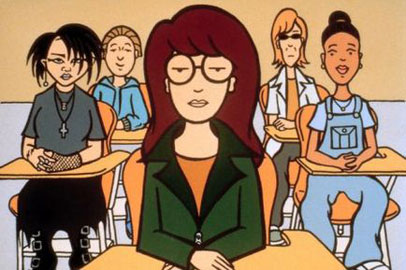
This weekend was certainly memorable for women in television. Perennial Golden Girl Betty White hosted Saturday Night Live, and many of my favorite past female cast members from my adolescence performed with her in sketches. While I wish the current female ensemble members besides Kristen Wiig were more prominently featured in current sketches, it's hard to deny White landing muffin jokes with such aplomb.
For many, tomorrow will be just as memorable as it marks the release of Daria on DVD. Originally on MTV between 1997 and 2002, the show will now be available in its entirety for diehards, as well as curious types who didn't or weren't able to watch the misery chick on cable.
Perhaps unsurprisingly, I loved Daria Morgendorffer. As a tribute, I went as her last Halloween. I was introduced to the smart, dry-witted teenage outcast during high school and she proved an inspiration for how to get through life in a small-town suburb. She also proved to me that you didn't have to be the prom queen to be cool. The only other girl character who had that kind of an impact on me growing up was tomboy turned comic book writer Darlene Conner on ABC's Roseanne.
Actually, I was a fan of Morgendorffer before Daria. Devotees will note that Morgendorffer made her first appearance on MTV in Mike Judge's Beavis and Butthead. She was written into the show to serve as a foil for the titular mook duo. As a fan of Beavis (primarily because my parents wouldn't let me watch it, but also because the twosome loved watching music videos), I always brightened at seeing Morgendorffer hang with them out of boredom, usually making jokes at their expense.

One of my big qualms with Beavis was that Morgendorffer didn't sit on the couch with the boys. I read Robin Roberts's Ladies First: Women in Music Video during grad school and while I appreciate her take on Beavis and Butthead's video commentaries as a post-modern, potentially feminist critique of MTV's target audience, having Morgendorffer lend her criticisms to popular clips would have been great. Can you imagine how she would have eviscerated Pantera?
At some point during Beavis's run, story editor Glenn Eichler was approached by the network to put together a Daria spin-off. With co-creator Susie Lewis Lynn and voice actress Tracy Grandstaff on board, the show debuted in late December 1996.
Daria documented Morgendorffer's transition into high school life in "typical" suburb Lawndale. As an adult feminist, it will be interesting to revisit the show to see how it addressed race and class implications. When it originally aired, however, I was immediately struck by Daria's emphasis on female friendships, particularly between Morgendorffer and like-minded artist Jane Lane. Despite their ennui, the girls were seen as empowered and politically active, often working together on subversive projects. The example that most immediately comes to mind is in season two opener "Arts N' Crass" wherein Morgendorffer and Lane submit a poster for a school spirit contest which features a withering depiction of teen girls and bulimia.

I liked the show's efforts to develop Morgendorffer's relationship with her younger and more popular sister Quinn. A lesser show may have simply written the character off as a vapid nitwit, but Daria made the character complex, relateable, surprisingly perceptive, and with whom the main character could occasionally confide. Similar things could be said of head cheerleader Brittany Taylor, who seemed like just a dumb blond but at times provided sound judgement and reason. In addition, I liked that Morgendorffer and Lane were friends with Jodie Landon, a smart and popular classmate who is involved with many extra-curricular activities and is one of the few black students at Lawndale High School. Thus, the show made an effort to suggest that there were multiple kinds of nerdy girls, and that they weren't the only young women of substance.

I also appreciated how music was incorporated into the show. While Morgendorffer didn't play an instrument in a rock outfit or get involved with choir or band, she was shown as being knowledgeable, oftentimes critical, of popular music. She is also a supporter of Lane's brother Trent and his band, though at first because of a crush.

Most notably, however, the show incorporated music as diegetic sound, with the animated characters interacting as contemporary music played in the background. It will be interesting to see if the DVDs retain any of the music that originally played during broadcast, which could help situate the show's place and time and also provide strategies in which to read certain characters. Most likely, however, it will have to resort to soundalikes, as cult MTV program The State had to in order to get the series released on DVD.
One musical element that will hopefully be retained is the theme song "You're Standing On My Neck," performed by Splendora. With its cacophonous opening, deceptively sweet hook, resistive lyrics, and deadpan female vocals, it's an ideal musical pairing for such a sardonic teen girl character. I don't think another song could better score Morgendorffer deliberately missing that gym class volley.
